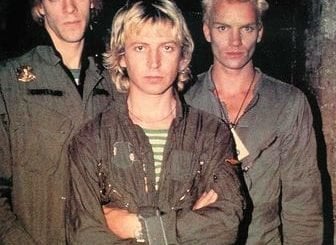Roxanne by The Police Lyrics Meaning – The Siren’s Call and the Red Light Mystique
Lyrics
You don’t have to put on the red light
Those days are over
You don’t have to sell your body to the night
Roxanne
You don’t have to wear that dress tonight
Walk the streets for money
You don’t care if it’s wrong or if it’s right
Roxanne
You don’t have to put on the red light
Roxanne
You don’t have to put on the red light
(Roxanne) Put on the red light
(Roxanne) Put on the red light
(Roxanne) Put on the red light
(Roxanne) Put on the red light
(Roxanne) Put on the red light
Oh
I loved you since I knew ya
I wouldn’t talk down to ya
I have to tell you just how I feel
I won’t share you with another boy
I know my mind is made up
So put away your make-up
Told you once, I won’t tell you again it’s a bad way
Roxanne
You don’t have to put on the red light
Roxanne
You don’t have to put on the red light
You don’t (Roxanne) have to put on the red light
(Roxanne) Put on the red light
(Roxanne) Put on the red light
(Roxanne) Put on the red light
(Roxanne) Put on the red light
(Roxanne) Put on the red light
(Roxanne) Put on the red light
(Roxanne) Put on the red light
(Roxanne) Put on the red light
(Roxanne) Put on the red light
You don’t (Roxanne) have to put on the red light
(Roxanne) Put on the red light
You don’t (Roxanne) have to put on the red light
(Roxanne) Put on the red light
(Roxanne) Put on the red light
With its haunting melody and evocative lyrics, The Police’s ‘Roxanne’ remains a captivating enigma that has intrigued and puzzled listeners since its release in 1978. This tune, which is as timeless as the subject it addresses, delves into the world of a woman entangled with the complexities of the night. It’s a powerful proclamation laden with both concern and condemnation that continues to resonate with audiences.
But beyond its catchy refrain and toe-tapping rhythm, ‘Roxanne’ is a song rich with hidden meanings and subtext that reflect the era’s cultural and social tensions. Let’s peel back the layers of this beloved rock classic and explore the deeper significance behind Sting’s poignant songwriting.
The Red Light: More Than Just a Signal
‘You don’t have to put on the red light.’ This hook is arguably one of the most unmistakable in rock history. However, the symbol of the red light reaches beyond its surface-level allusion to the profession of the woman named Roxanne. It stands as a stark metaphor for urgency, danger, and the sale of one’s self—not merely in physical terms but also in the emotional and psychological sense.
In the context of the song, the red light is both a literal and figurative crossroads for Roxanne. It’s where her personal agency collides with societal expectations, and where her choices are illuminated under the scrutinizing glow of the proverbial red light.
A Plea for Redemption and Respect
The song’s narrator passionately pleads with Roxanne, asking her not to subject herself to the exploitative nature of her environment. This can be read as a compassionate call from someone who sees the worth in a person beyond their circumstance. As Sting croons, ‘I loved you since I knew ya,’ the listener detects a heartfelt sorrow for Roxanne’s situation coupled with a genuine desire for her redemption.
The Police thus challenge the stigmas surrounding women who, like the titular character, find themselves in the oldest profession. There’s an evident push for understanding and empathy, suggesting that this isn’t just a song about a lady of the night; it’s a broader social commentary.
Dressed in Melancholy – The Sonics of Sorrow
‘Roxanne’ isn’t just lyrically poignant; it’s musically expressive in its conveyance of sorrow. The song’s minor chords and the intimate, plaintive tenor of Sting’s vocals encapsulate a mood that’s undeniably morose and reflective.
The tension and release within the music mirror the emotional complexity found within the song’s themes. It is as much a triumph of musical composition as it is a testament to vivid storytelling.
The Hidden Meaning Behind ‘Those Days Are Over’
When Sting writes, ‘Those days are over,’ there’s a layered significance to these words. For Roxanne, on a personal level, this could signal an end to her nights under the red light and a beginning of something new. On a larger scale, it hints at the end of an era where such destitute choices might be the only option for women like her.
These few words are laden with hope for change, a cessation of suffering and the dawning of an era where a woman’s value isn’t determined by her desirability or the decrees of a judgmental public.
The Lasting Echo of ‘Roxanne’s’ Memorable Lines
There are songs that linger on for the tenacity of their lyrics, and ‘Roxanne’ is a prime example. Lines like ‘You don’t care if it’s wrong or if it’s right’ encapsulate the internal conflict faced by those in Roxanne’s position. They resonate because they reflect the moral ambivalence and the grit required to navigate a world that often offers no easy choices.
‘Roxanne’ isn’t just a song; it’s a cultural touchstone that continues to haunt and inspire listeners. It might be Sting’s impassioned voice that draws us in, but it’s the poignant narrative and introspective exploration of human frailty that keeps us mulling over its words, long after the last note fades.








